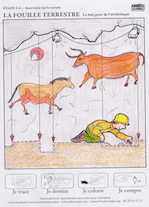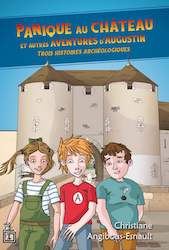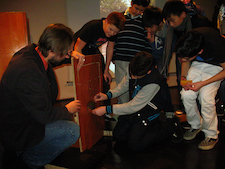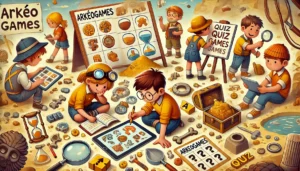Introduce your students to archaeology!
Archaeology resources
ArkeoTopia regularly creates edutainment resources around archaeology, cultural heritage and science, accessible free of charge. These resources are linked to official programs and help students and teachers acquire investigation skills.
Some students in your class are not interested in reading!
Show them Fairies against facts, rom reading to drama, a fun-educational short film that lets them see that reading is not an isolated act but can be practiced with others. While improving their ability to read, your students will also learn about scientific culture and its language, through archaeology.
Also discover our reviews of children’s books, interviews with people involved in education and archaeology as well as the latest archaeological news on our social networks, not to mention our critical bibliography for educational uses.
Our latest free educational resources:
Our latest free educational resources:
Educational materials
 With the young archaeologist Augustin, his friends Octave the poet and Manon the engineer, introduce your students to the fantastic world of archaeology. Intended for students aged 5 to 14, the books and discovery workbooks of Augustin’s World develop skills in reading, history, arts history, science and also writing:
With the young archaeologist Augustin, his friends Octave the poet and Manon the engineer, introduce your students to the fantastic world of archaeology. Intended for students aged 5 to 14, the books and discovery workbooks of Augustin’s World develop skills in reading, history, arts history, science and also writing:
- Novel – Panic at the Castle, three of Augustin’s archaeological adventures for middle school
- Discovery workbooks entitled – My Archaeology Book 1 (Kindergarten and Primary school until 2nd Grade) and My Archaeology Book 2 (Middle School until 14 years old)
We can provide cultural and scientific events for in-person or remote learning
 How can you motivate your students in science and history lessons? If you don’t feel very comfortable with the scientific approach and the teaching of science in general, try the activities that we offer. These sessions can be in-person or remote (your class must have an Internet connection and a projection screen).
How can you motivate your students in science and history lessons? If you don’t feel very comfortable with the scientific approach and the teaching of science in general, try the activities that we offer. These sessions can be in-person or remote (your class must have an Internet connection and a projection screen).
Click on the order button for each article to order cultural activities and scientific outreach activities from us (1).
Our latest activities for children with the ArkaeoKids:
 We also offer guided tours with the ArkaeOdyssey which will take you off the beaten track to discover places rich in history and full of stories. Although the in-person visits are mainly in Paris and can be arranged, on demand, for a student class, we can also carry out remote visits. We have great expertise in organising virtual meetings using comments, photos, videos, deciphering and interactive exchanges. Some of our ArkaeOdyssey in museums can be the subject of a virtual visit. Discover our ArkaeOdyssey:
We also offer guided tours with the ArkaeOdyssey which will take you off the beaten track to discover places rich in history and full of stories. Although the in-person visits are mainly in Paris and can be arranged, on demand, for a student class, we can also carry out remote visits. We have great expertise in organising virtual meetings using comments, photos, videos, deciphering and interactive exchanges. Some of our ArkaeOdyssey in museums can be the subject of a virtual visit. Discover our ArkaeOdyssey:
We perform other on-demand services such as music concerts with the ArkaeoRock, board game sessions around archaeology and cultural heritage as well as using Playmobil to show discoveries in scientific research. You can get an overview of our previous educational activities with:
How to become an archaeologist?
This question comes up frequently. In addition to receiving under certain conditions interns from middle school, we intervene face-to-face or remotely in primary and secondary schools that want to introduce people to heritage professions including that of archaeologist. This is also why, in its training resources, ArkeoTopia offers some guidelines through our article ArkeoTopia – a guidebook for your studies and our resources on career guidance, with these latest articles:
ArkeoTopia and education
 ArkeoTopia, another path for archaeology, aims to take another look at today’s archaeology to help existing organizations prepare for that of tomorrow. This is why we attach great importance to quality of science outreach activitie as well as to facilitate guidance and training of young people.
ArkeoTopia, another path for archaeology, aims to take another look at today’s archaeology to help existing organizations prepare for that of tomorrow. This is why we attach great importance to quality of science outreach activitie as well as to facilitate guidance and training of young people.
To find out more about our association, find the articles about it on the web, in print, on the radio and on television by following our sections on the press and on the association:
If you wish to contact us, write to us via our form.
1. Cultural workshops will place more emphasis on the transmission of knowledge, while science workshops will link knowledge, skills and behavior specific to the work of archaeologists. To more information, see our article, The Organization of Educational Rhythms, a different learning time from school in France ![]()



